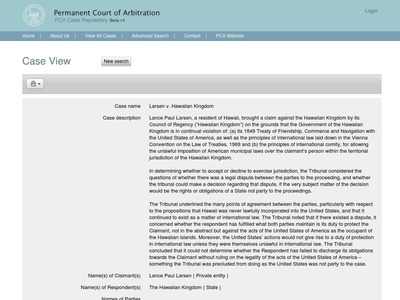Permanent Court of Arbitration (PCA): Larsen v. Hawaiian Kingdom
https://www.pcacases.com/web/view/35
Description
Lance Paul Larsen, a resident of Hawaii, brought a claim against the Hawaiian Kingdom by its Council of Regency (“Hawaiian Kingdom”) on the grounds that the Government of the Hawaiian Kingdom is in continual violation of: (a) its 1849 Treaty of Friendship, Commerce and Navigation with the United States of America, as well as the principles of international law laid down in the Vienna Convention on the Law of Treaties, 1969 and (b) the principles of international comity, for allowing the unlawful imposition of American municipal laws over the claimant’s person within the territorial jurisdiction of the Hawaiian Kingdom.
In determining whether to accept or decline to exercise jurisdiction, the Tribunal considered the questions of whether there was a legal dispute between the parties to the proceeding, and whether the tribunal could make a decision regarding that dispute, if the very subject matter of the decision would be the rights or obligations of a State not party to the proceedings.
The Tribunal underlined the many points of agreement between the parties, particularly with respect to the propositions that Hawaii was never lawfully incorporated into the United States, and that it continued to exist as a matter of international law. The Tribunal noted that if there existed a dispute, it concerned whether the respondent has fulfilled what both parties maintain is its duty to protect the Claimant, not in the abstract but against the acts of the United States of America as the occupant of the Hawaiian islands. Moreover, the United States’ actions would not give rise to a duty of protection in international law unless they were themselves unlawful in international law. The Tribunal concluded that it could not determine whether the Respondent has failed to discharge its obligations towards the Claimant without ruling on the legality of the acts of the United States of America – something the Tribunal was precluded from doing as the United States was not party to the case.

